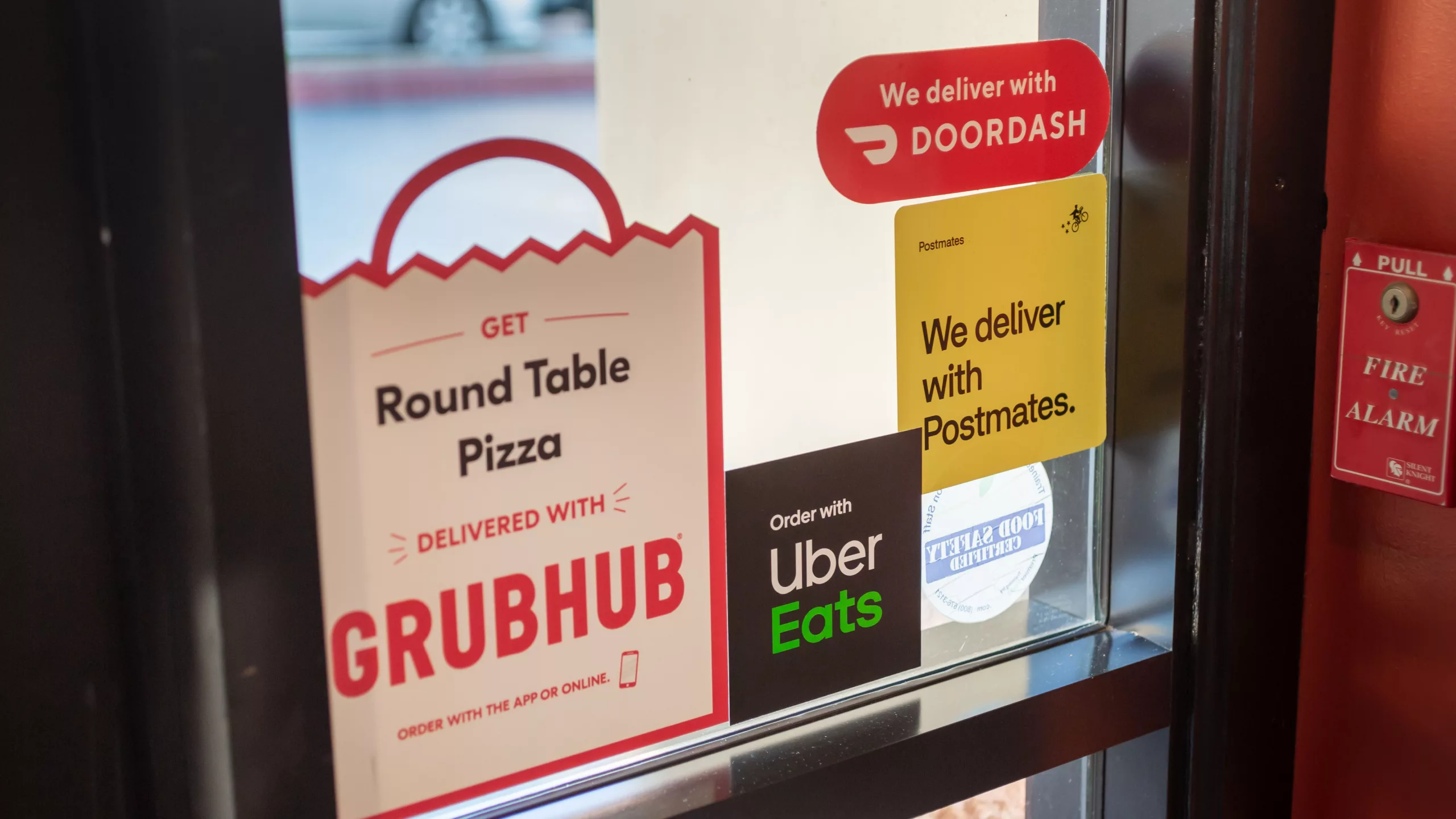Beginning this year, the city implemented a historic minimum wage law for app-based delivery workers, raising wages from an average of $5.39 per hour before tips to at least $17.96 per hour before tips. While the law has seen some success, workers are still sounding the alarm about ongoing patterns of wage theft.
About 50 delivery workers organizing with the Workers Justice Project (WJP) protested Wednesday morning outside DoorDash’s Manhattan headquarters, demanding that the company pay workers their unpaid wages.
Also Read: NYC Labor Complaints Surge 260% as Delivery Workers Lead Fight for Fair Wages
According to WJP, 95 DoorDash delivery workers have filed claims with the NYC Department of Consumer and Worker Protection (DCWP), alleging that DoorDash failed to pay them for their back wages after they were deactivated from the platform, and that they violated the city’s delivery worker minimum wage law.
WJP said that the DoorDash delivery workers have been seeking their assistance since 2020. In total, WJP claims DoorDash owes the workers $78,569 in unpaid wages. Despite their efforts to seek mediation with the company, WJP says that DoorDash has ignored them, forcing them to begin filing complaints with DCWP last year.
In a statement, Michael Lanza, press secretary for DCWP, said they are investigating the claims, and urges others with questions or complaints to come forward as soon as possible.
In February, Documented was the first to report that delivery workers filed over 500 complaints with DCWP regarding violations of the minimum wage law. The story prompted WJP to investigate further claims, they said.
Long-time DoorDash worker Juan Iturbide, 40, says DoorDash owes him a significant amount of money and has made repeated attempts to retrieve his unpaid wages. An immigrant from Mexico, Iturbide said he has worked for DoorDash for five years and that the company owes him $1,500 after he was deactivated in November 2021. He filled his case with DCWP in 2023.
“Delivery work is one of the most dangerous occupations in the city,” he said. “In addition to risking our lives, we shouldn’t have to worry about being robbed by such a wealthy company. We deserve to be paid for the service we provide.”
Another worker, Santos Mateo Oberto, 23, says he is owed $1,700 from DoorDash. Oberto, an immigrant from Guatemala, filed his claim with DCWP in October. After working for the company for five years, he was deactivated a year and a half ago. Since then, Oberto has been fighting to retrieve his unpaid wages. WJP contacted DoorDash on his behalf in 2022. However, WJP said that since DoorDash told them they would look into Oberto’s claim, they have not heard from the company.
“Every day that DoorDash fails to pay us, they deny our right to a livelihood and our ability to provide for ourselves and our family,” Oberto said. “That is unjust.”
As a result of the workers’ wage theft complaints, WJP said that DCWP had issued letters for 11 individuals in support of a deferred action application to the Department of Homeland Security. Victims or witnesses of a crime, such as wage theft, could qualify for “deferred action,” which provides temporary protection from deportation for noncitizens.
Once approved, a worker may also receive work authorization for up to four years. WJP expects another 31 delivery workers to apply for deferred action by the end of this month.
This is not the first time DoorDash has been accused of wage theft. Last year, THE CITY reported that the delivery app stole $22,000 in wages from 13 workers. The company ultimately paid the workers the owed wages in December 2023. Just this year in Illinois, on Nov. 8, DoorDash agreed to pay $11.25 million to about 80,000 Illinois DoorDash delivery workers for a wage theft scheme it conducted between 2017 and 2019.
According to the Illinois Attorney General’s Office, DoorDash engaged in a scheme that used tips to reduce the amount the company actually paid its workers. In some instances, the company contributed as little as $1 toward a worker’s pay and illegally substituted the rest of the pay with tips.
Gabriel Montero, director of development and communication for WJP, said that the “exploiting” of immigrant workers is an integral part of DoorDash’s business.
一文教你如何成为街头市集或夜市摊主
“We are seeing a fairly pervasive pattern of unpaid wages,” he said. “What we see in many cases are workers who are newly arrived immigrant workers who don’t know the law. This business model, in general, depends on exploiting workers.”
However, Eli Scheinholtz, a spokesperson for DoorDash, said that the workers’ claims represent just a small fraction of DoorDash workers. According to the city, New York has about 65,000 app-based delivery workers, many of whom work for DoorDash. Scheinholtz said that many of the claims made could be attributed to human error, for instance, submitting incorrect banking or identity information, which could lead to payment delays.
“While we have not received evidence regarding these particular allegations, we take all concerns around Dasher pay seriously, and investigate claims like these to make sure Dashers who properly do work on our platform receive what they’re owed,” said Scheinholtz in a statement. “Here’s what we know to be true: Dashers in New York City get paid for the time spent completing work on our platform, in accordance with the city’s minimum pay rules. If their pay does not meet the minimum pay rate at the end of the week, then they receive an adjustment without exception.”
If workers have issues with payments, Scheinholtz said he encourages delivery workers to contact the company so they can quickly address their concerns.














